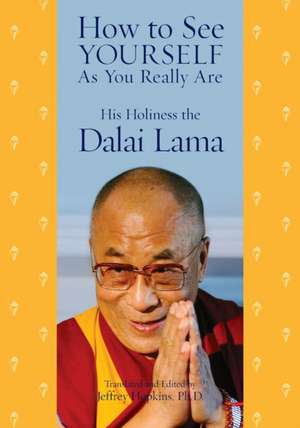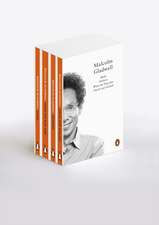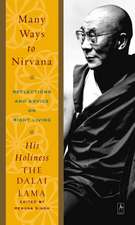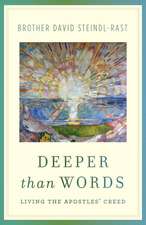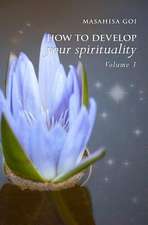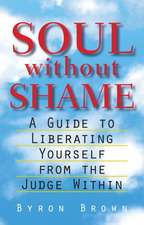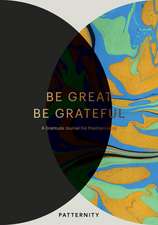How to See Yourself as You Really Are
Autor Dalai Lama Editat de Jeffrey Hopkinsen Limba Engleză Paperback – 31 oct 2007
Enlivened by personal anecdotes and intimate accounts of the Dalai Lama's own life experiences, "How to See Yourself As You Really Are" is an inspirational and empowering guide that can be read and enjoyed by anyone seeking spiritual fulfillment.
| Toate formatele și edițiile | Preț | Express |
|---|---|---|
| Paperback (2) | 67.55 lei 26-32 zile | +22.18 lei 7-13 zile |
| Ebury Publishing – 2 ian 2008 | 67.55 lei 26-32 zile | +22.18 lei 7-13 zile |
| Atria Books – 31 oct 2007 | 98.94 lei 3-5 săpt. |
Preț: 98.94 lei
Nou
Puncte Express: 148
Preț estimativ în valută:
18.93€ • 19.82$ • 15.67£
18.93€ • 19.82$ • 15.67£
Carte disponibilă
Livrare economică 15-29 martie
Preluare comenzi: 021 569.72.76
Specificații
ISBN-13: 9780743290463
ISBN-10: 0743290461
Pagini: 274
Dimensiuni: 128 x 183 x 19 mm
Greutate: 0.2 kg
Editura: Atria Books
ISBN-10: 0743290461
Pagini: 274
Dimensiuni: 128 x 183 x 19 mm
Greutate: 0.2 kg
Editura: Atria Books
Descriere
In a practical, uplifting, and deeply relevant new work, His Holiness the Dalai Lama guides readers along the path to self-knowledge using the traditional Buddhist steps of meditative reflection.
Notă biografică
Tenzin Gyatso, the Fourteenth Dalai Lama, is the spiritual leader of the Tibetan people. He frequently describes himself as a simple Buddhist monk. Born in northeastern Tibet in 1935, he was as a toddler recognized as the incarnation of the Thirteenth Dalai Lama and brought to Tibet's capital, Lhasa. In 1950, Mao Zedong's Communist forces made their first incursions into eastern Tibet, shortly after which the young Dalai Lama assumed the political leadership of his country. He passed his scholastic examinations with honors at the Great Prayer Festival in Lhasa in 1959, the same year Chinese forces occupied the city, forcing His Holiness to escape to India. There he set up the Tibetan government-in-exile in Dharamsala, working to secure the welfare of the more than 100,000 Tibetan exiles and prevent the destruction of Tibetan culture. In his capacity as a spiritual and political leader, he has traveled to more than sixty-two countries on six continents and met with presidents, popes, and leading scientists to foster dialogue and create a better world. In recognition of his tireless work for the nonviolent liberation of Tibet, the Dalai Lama was awarded the Nobel Peace Prize in 1989. In 2012, he relinquished political authority in his exile government and turned it over to democratically elected representatives.
His Holiness frequently states that his life is guided by three major commitments: the promotion of basic human values or secular ethics in the interest of human happiness, the fostering of interreligious harmony, and securing the welfare of the Tibetan people, focusing on the survival of their identity, culture, and religion. As a superior scholar trained in the classical texts of the Nalanda tradition of Indian Buddhism, he is able to distill the central tenets of Buddhist philosophy in clear and inspiring language, his gift for pedagogy imbued with his infectious joy. Connecting scientists with Buddhist scholars, he helps unite contemplative and modern modes of investigation, bringing ancient tools and insights to bear on the acute problems facing the contemporary world. His efforts to foster dialogue among leaders of the world's faiths envision a future where people of different beliefs can share the planet in harmony. Wisdom Publications is proud to be the premier publisher of the Dalai Lama's more serious and in-depth works.
Jeffrey Hopkins, Ph.D., served for a decade as the interpreter for the Dalai Lama. A Buddhist scholar and the author of more than thirty-five books and translations, he is emeritus professor of Tibetan and Buddhist studies at the University of Virginia, where he founded the largest academic program of Tibetan Buddhist studies in the West.
His Holiness frequently states that his life is guided by three major commitments: the promotion of basic human values or secular ethics in the interest of human happiness, the fostering of interreligious harmony, and securing the welfare of the Tibetan people, focusing on the survival of their identity, culture, and religion. As a superior scholar trained in the classical texts of the Nalanda tradition of Indian Buddhism, he is able to distill the central tenets of Buddhist philosophy in clear and inspiring language, his gift for pedagogy imbued with his infectious joy. Connecting scientists with Buddhist scholars, he helps unite contemplative and modern modes of investigation, bringing ancient tools and insights to bear on the acute problems facing the contemporary world. His efforts to foster dialogue among leaders of the world's faiths envision a future where people of different beliefs can share the planet in harmony. Wisdom Publications is proud to be the premier publisher of the Dalai Lama's more serious and in-depth works.
Jeffrey Hopkins, Ph.D., served for a decade as the interpreter for the Dalai Lama. A Buddhist scholar and the author of more than thirty-five books and translations, he is emeritus professor of Tibetan and Buddhist studies at the University of Virginia, where he founded the largest academic program of Tibetan Buddhist studies in the West.
